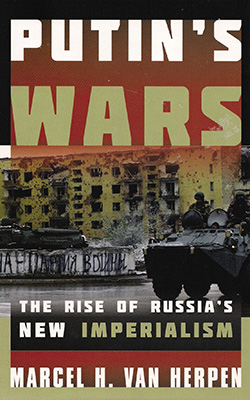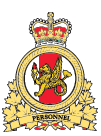BOOK REVIEWS

Putin’s Wars: The Rise of Russia’s New Imperialism
by Marcel H. Van Herpen
Lanham, Maryland: Rowman and Littlefield, 2014
276 pages, $82.95 (hardcover)
ISBN 978-1-4422-3136-8
For more information on accessing this file, please visit our help page.
Reviewed by Peter J. Williams
In my day, a rite of passage for any junior army officer was completion of the Force Mobile Command (FMC) Officer Examinations, commonly known as ‘FOE.’ There were two such exams, one on Operations, and the other on Administration. You could be guaranteed that one question which was sure to appear was for the student to draw the organization chart of a ‘Fantasian’ (the thinly disguised fictional enemy, based upon the former Soviet Warsaw Pact) Motor Rifle Regiment, down to the platoon level. However, no sooner had my peers and I all passed these exams, than the Berlin Wall came down, the Canadian Armed Forces (CAF) then went on a string of peacekeeping/peacemaking missions in Somalia, the Balkans, and other places, and we consigned much of our knowledge about the Fantasians to the literal dust bin of history, or to whatever passed for archives in those days. And we never really looked back, Counter Insurgency (COIN), now being our watchword in the post 9-11 era.
With Afghanistan now largely behind us, it appears that for those who pine for the days of more certainty about the enemy which the Cold War represented to a degree, the actions of one Vladimir Putin, currently the President of the Russian Federation, might represent something of a long awaited (perhaps long hoped for in some quarters) return to military affairs in a more comprehensible form. In any case, once cannot deny that Russia’s actions in recent months, particularly in Ukraine, have garnered world attention, including that of the author of this book, himself the Director of the Cicero Foundation, an independent Pro-European Union (EU) and Pro-Atlantic think tank, based in Maastricht, the Netherlands. Their role is to provide a broad, global forum to discuss issues that are of central importance to European integration.1
Using the examples of the Russian military interventions in Chechnya and in Georgia in 2008, the author’s aim is to demonstrate that what he views as Russia’s colonization of neighbouring states has been a continuous process throughout its history.
The book is divided into three parts:
- Part 1 looks at the major role which empire building and expansionism played in Russia’s history, and the author takes us back to the 18th Century in order to provide his point;
- Part 2 covers the so-called “Internal War,” which Putin had to wage from his accession to the presidency in order to secure his vision for Russia’s future; and
- Part 3, the longest section, compares the two wars under consideration with other wars fought by the Soviets and their successors, including the Cold War, Afghanistan, and the First Chechen War.
While all readers might not agree with Van Herpen’s analysis, I found it somewhat difficult to refute his arguments, and indeed, his contention that Putin’s supreme political goal is to restore Russia’s so-called “lost empire.” The author goes somewhat further in stating that this new Russian imperialism had its start earlier than Putin, claiming provenance under former Soviet leader Leonid Brezhnev’s concept of “limited sovereignty” and Yeltsin’s designation of Russia’s periphery as its “Near Abroad.”2 In the author’s view, Putin has two main aims: first, to create, or rather to restore a close union of core Slavic, former Soviet nations, and second, to create closer military and economic ties with non-Slavic, but still former Soviet states. Indeed, in agreements Putin has made with neighbouring Belarus, and by virtue of the creation of the Collective Security Treaty organization (CSTO), he is putting his intentions into action. What I found quite interesting was the author’s descriptions of the extent to which Putin co-opted the support of groups as diverse as Russian youth on one hand, and Cossacks on the other, in order to advance his goals. Where Putin ran into opposition, whether at home or abroad, he, in the authors view, at least showed no compunction in acting most ruthlessly. Van Herpen states that Putin’s goal in Georgia was regime change pure and simple, while he also suggests that Russian state authorities, and not Chechen separatists, were behind a series of apartment bombings across Russia, thus providing Putin ostensible justification for launching the Second Chechen War.
The book is obviously well-researched, containing a bibliography which includes many Russian sources. Notes, in many cases very detailed, are included at the end of each chapter. The book in many instances reads very much like a textbook, as at several points in the text, Van Herpen lists several reasons behind certain issues under consideration, and then, quite eloquently, and in some cases rather bluntly, goes on to make his point, rather convincingly in the opinion of this reviewer. If there was one omission, I believe it was the absence of any maps to place the author’s analysis in context. With all the focus upon the Ukraine at present, the average reader may be somewhat geographically challenged when trying to place the locations of other, former Soviet republics.
At the outset of the Cold War, an American diplomat in Moscow, George Kennan, wrote his famous article in the journal Foreign Affairs entitled “The Sources of Soviet Conduct.”3 Rarely has a journalistic article had such an impact upon foreign policy. As a result, ‘The West’ adopted the policy of ‘Containment’ against the Soviet Union for the balance of the Cold War. ‘Fast forward’ to today, and for those looking for the rationale for President Putin’s conduct, this book represents an excellent start, and I would look forward to a sequel which covers the current crisis in Ukraine. Whether the modern ‘West’ and its partners will come up with a viable strategy, beyond sanctions and low-scale military activities in Eastern Europe, in order to respond to ‘Putin’s Wars’ remains to be seen.
Putin’s Wars is highly recommended by this reviewer. It must be a popular book as well, as no sooner had I borrowed it from the NDHQ library, than they informed me that someone wanted to read it when I had finished. I was also firmly reminded that my due date stood!
Colonel P.J. Williams is currently serving as Director Arms Control Verification on the Strategic Joint Staff.
NOTES
- www.cicerofoundation.org.
- Marcel H. Van Herpen, Putin’s Wars: The Ruse of Russia’s New Imperialism (Lanham, MD: Rowman and Littlefield, 2014), p. 57.
- Mr X (George F. Kennan), “The Sources of Soviet Conduct,” in Foreign Affairs, Vol. 25, No. 4 (July 1947).







